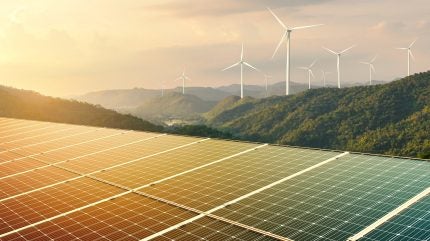
Lawmakers in the US House have reportedly introduced a budget proposal, which aims to eliminate clean energy tax incentives and cut funding for electric vehicles and renewable energy sources.
This initiative is part of efforts to pass a multi-trillion-pound budget that reflects the priorities of US President Donald Trump.

Discover B2B Marketing That Performs
Combine business intelligence and editorial excellence to reach engaged professionals across 36 leading media platforms.
Reuters reported that the House Committee on Energy and Commerce has outlined a proposal that is scheduled for a vote today (13 May 2025), which aims to raise $6.5bn by repealing climate-related elements of the Biden administration’s Inflation Reduction Act.
This move has faced backlash from organisations representing the solar and wind sectors, who warn it could result in job losses.
The House Ways and Means panel has recommended the cancellation of various tax incentives from Biden’s climate legislation, including those for electric vehicle purchases and home energy efficiency upgrades.
Furthermore, significant clean energy subsidies are proposed to be phased out by 2031, raising alarms among industry representatives, according to the news agency.

US Tariffs are shifting - will you react or anticipate?
Don’t let policy changes catch you off guard. Stay proactive with real-time data and expert analysis.
By GlobalDataAmong the proposed reductions is a swift phase-out of the “technology-neutral” 45Y tax credits for different clean energy technologies, including nuclear and geothermal.
These credits, which previously had no expiration date, would experience substantial decreases in value, leading up to their complete removal after 2031.
The proposal also aims to abolish transferability provisions from the 2022 Inflation Reduction Act, which permitted developers to sell tax credits to fund project construction.
However, tax incentives for carbon capture and sequestration, which are favoured by the oil and gas industry, will largely remain unchanged, albeit with some limitations on foreign ownership.
Additionally, the House energy panel’s plan seeks to revoke significant Environmental Protection Agency regulations, including those that restrict emissions for light-duty and medium-duty vehicles starting in 2027.
The proposal also includes provisions to accelerate permitting for liquefied natural gas (LNG) exports and allocates over $1.5bn for replenishing the Strategic Petroleum Reserve.
The bill proposes to rescind unspent funds from the $27bn greenhouse gas reduction fund, which has been scrutinised by EPA administrator Lee Zeldin.
It also aims to reclaim unspent funding from various renewable energy and electrification subsidy initiatives established under the IRA.
Further proposed rescissions include funds intended for methane reduction at oil and gas facilities, greenhouse gas reporting, and initiatives to reduce air emissions at ports and educational institutions.
These cuts form part of a broader strategy to redirect resources away from clean energy programmes.
Despite the proposed reductions, more than two dozen Republicans in the House, along with four Republican senators from states that have benefited from IRA investments, have urged the committee to retain several tax incentives.
Advocates for clean energy have indicated that while the phase-outs may not be as drastic as feared, they still represent a considerable setback for the clean energy industry.
Solar Energy Industries Association president Abigail Ross Hopper said: “While American businesses are demanding more energy to compete against our adversaries, and consumers are turning to clean energy to hedge against rising electricity prices, these proposals will undermine our nation’s efforts to achieve President Trump’s American energy dominance agenda.
“This legislation will cause hundreds of American factories to close, eliminate tens of thousands of jobs, force electric bills to skyrocket for everyone, weaken the reliability of our electric grid, and eliminate our capacity to compete with China. This disruption would devastate local, red-state economies, with more than 75% of at-risk factories and investments concentrated in these communities.”



